Instruction
How to fix the dreaded chicken wing
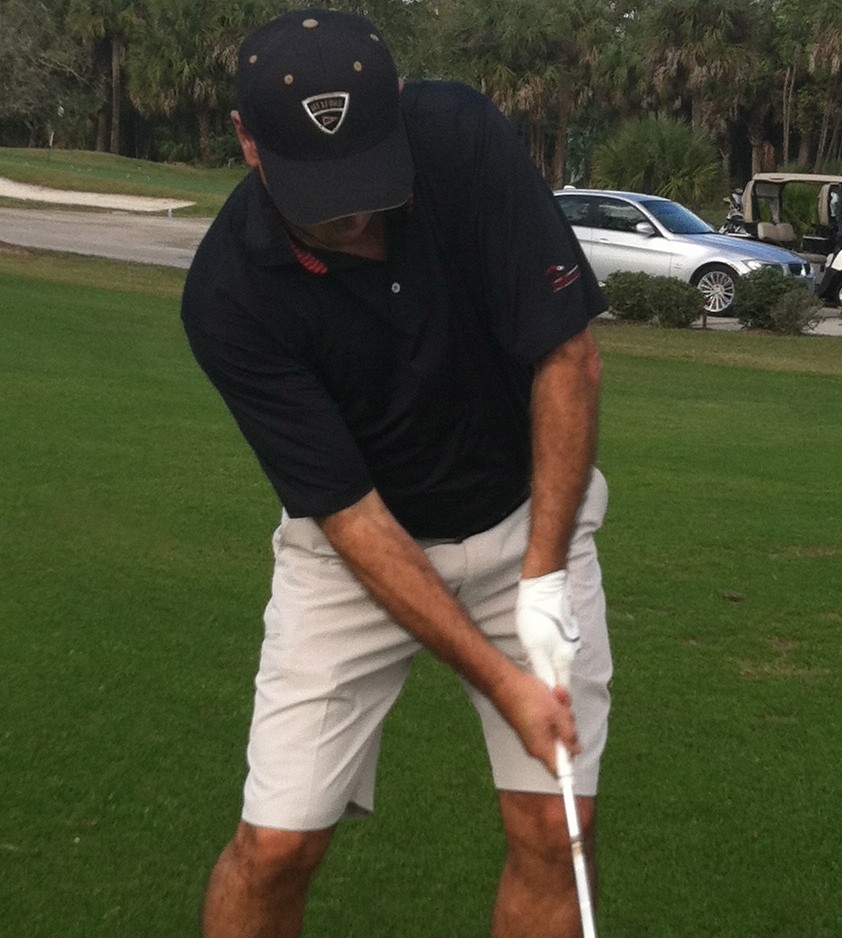
A lot of golfers, when describing the “problem” with their swing, say something like, “I know I have a chicken wing, I just cant stop doing it!”
In golf, a “chicken wing” is the shortening of the left arm (for a right-handed golfer) in the downswing and into impact. I call these types of moves in the golf swing “fit-ins” or “savers” — golfers fit them into their swing to complement another error, and they use the move(s) to try and “save” the swing from calamity.
When a golfer is conscious of a habit, but cannot refrain from doing it, there must be a good reason for it. No one woke up one day and decided to “chicken wing” their left arm. They are doing so because they MUST; for the simple reason that if they didn’t do it, something worse than what usually happens would occur.
What could be worse than a weak slice? Slamming the golf club into the ground on the the downswing might be worse — much worse, because the weak slice goes somewhere, the fat shot does not.
Hitting the ground behind the ball is a golfer’s worst nightmare. It is an embarrasing shot that only goes a few yards, gets your clothes dirty and makes you look like a duffer more than any shot in golf (shank possibly excepted). Golfers will do anything to avoid it, so when their body or your brain senses a crash, it is going to get off the road, one way or another.
An involuntary habit, by definition, is one over which you have no control. So you typically do one of a few things: stand up, fall back, or chicken wing. All three of these disastrous motions are typically caused by the golf club starting down too STEEP in the transition from a golfer’s backswing to downswing.
If the shaft plane is steep when a golfer starts their downswing, with the butt end of the club pointed at a golfer’s feet or the ground between the feet and the ball, a golfer senses that he or she is headed for a crash, and reacts accordingly.
A too steep down swing (left), versus a downswing that is flatter (right).
I’m often asked, what can I do to fix my lifting or my chicken wing? There is no drill that I know of, or a teaching aid that will help you if you are consitently on too steep of an angle in the downswing. You have to fix the root cause of the problem — you have to learn to “lay the shaft down,” or flatten your transition.
Much like slicing; if you want to develop a more inside path you have to get rid of the slice. The same thing goes along with saving the downswing. Think of it this way: if the shaft was way too flat, as some are, a golfer would consistenly top the ball and actually dive DOWN to hit it. These swings are rarely guity of chicken winging, because the gound simply isn’t in play as much for them. So we’re back to my theory of golf as a reaction game (click to read the original story).
PGA Tour players don’t chicken wing or stand up, believe me. But you, dear reader, Mr. bogey golfer, what can you do about this move? These are a few of the things I recommend:
- Hit balls on a side hill lie with ball above your feet. Think baseball.
- Hit balls off an high tee with the club in the air as high as the tee at address. Think baseball.
- Go to the top of your swing and pause: Feel your right wrist cup (dorsiflexion) and your left wrist bow (palmar flexion)
- At the top of swing, your right forearm is angled similarly to your upper body. Immediately make it more vertical, moving the right elbow OUT in front of you.
Notice how the wrist action I descibed and the right forearm action happen together — as the left wrist bows, the right wrist cups and the right forearm moves out. Now notice the position of the shaft: The butt end is now pointing OUTSIDE the golf ball, and you are in a better position from which to start down.
The sidehill drill cannnot be overdone for many of you — the more you think “lay the shaft down” in transition the better off you will be. If you have seen your swing on video with your pro, he has probably pointed out this steepness. If you’re one of the many in this position, these drills are worth a try. When, and only when you get into this position to start down will you feel the freedom to extend your arms, particularly your left arm, into impact. You will not fear fat, in fact, you will start to top the ball, UNTIL you learn to stay down, keep rotating and extend the arms.
If you want a great winter project, think about this and do it thousands of times in your indoor center, garage or wherever. You don’t even have to swing — just learn to start down more horizontally so you can STAY DOWN into impact.
One last thing: note earlier I said the player typically does one or a few things to avoid fat shots: chicken winging, standing up OR falling back. If you find yourself “backing up” into impact with the upper body adding extra tilt back into the classic “reverse C” look, it is often because of the very same steepness I decribed starting down. You are all trying to shallow out the golf club to avoid hitting the big ball instead of the little one.
As always, feel free to send a swing video to my Facebook page and I will do my best to give you my feedback.
Click here to see what people are saying in the “Instruction & Academy” forum.
- LIKE103
- LEGIT15
- WOW8
- LOL8
- IDHT5
- FLOP6
- OB7
- SHANK9
Instruction
The Wedge Guy: The easiest-to-learn golf basic
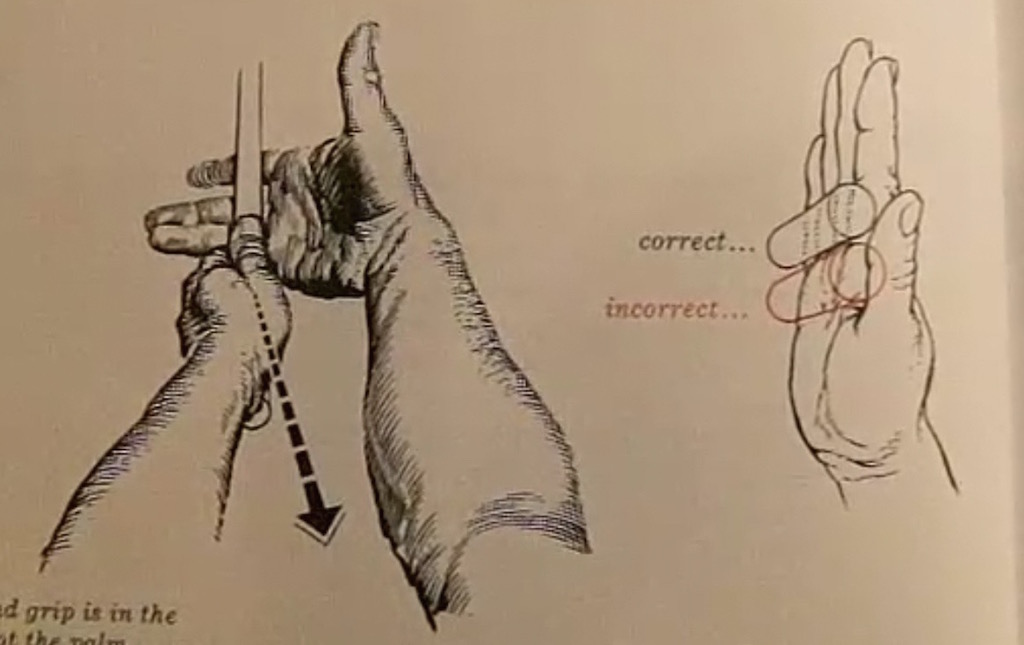
My golf learning began with this simple fact – if you don’t have a fundamentally sound hold on the golf club, it is practically impossible for your body to execute a fundamentally sound golf swing. I’m still a big believer that the golf swing is much easier to execute if you begin with the proper hold on the club.
As you might imagine, I come into contact with hundreds of golfers of all skill levels. And it is very rare to see a good player with a bad hold on the golf club. There are some exceptions, for sure, but they are very few and very far between, and they typically have beat so many balls with their poor grip that they’ve found a way to work around it.
The reality of biophysics is that the body moves only in certain ways – and the particulars of the way you hold the golf club can totally prevent a sound swing motion that allows the club to release properly through the impact zone. The wonderful thing is that anyone can learn how to put a fundamentally sound hold on the golf club, and you can practice it anywhere your hands are not otherwise engaged, like watching TV or just sitting and relaxing.
Whether you prefer an overlap, interlock or full-finger (not baseball!) grip on the club, the same fundamentals apply. Here are the major grip faults I see most often, in the order of the frequency:
Mis-aligned hands
By this I mean that the palms of the two hands are not parallel to each other. Too many golfers have a weak left hand and strong right, or vice versa. The easiest way to learn how to hold the club with your palms aligned properly is to grip a plain wooden ruler or yardstick. It forces the hands to align properly and shows you how that feels. If you grip and re-grip a yardstick several times, then grip a club, you’ll see that the learning curve is almost immediate.
The position of the grip in the upper/left hand
I also observe many golfers who have the butt of the grip too far into the heel pad of the upper hand (the left hand for right-handed players). It’s amazing how much easier it is to release the club through the ball if even 1/4-1/2″ of the butt is beyond the left heel pad. Try this yourself to see what I mean. Swing the club freely with just your left hand and notice the difference in its release from when you hold it at the end of the grip, versus gripping down even a half inch.
To help you really understand how this works, go to the range and hit shots with your five-iron gripped down a full inch to make the club the same length as your seven-iron. You will probably see an amazing shot shape difference, and likely not see as much distance loss as you would expect.
Too much lower (right) hand on the club
It seems like almost all golfers of 8-10 handicap or higher have the club too far into the palm of the lower hand, because that feels “good” if you are trying to control the path of the clubhead to the ball. But the golf swing is not an effort to hit at the ball – it is a swing of the club. The proper hold on the club has the grip underneath the pad at the base of the fingers. This will likely feel “weak” to you — like you cannot control the club like that. EXACTLY. You should not be trying to control the club with your lower/master hand.
Gripping too tightly
Nearly all golfers hold the club too tightly, which tenses up the forearms and prevents a proper release of the club through impact. In order for the club to move back and through properly, you must feel that the club is controlled by the last three fingers of the upper hand, and the middle two fingers of the lower hand. If you engage your thumbs and forefingers in “holding” the club, the result will almost always be a grip that is too tight. Try this for yourself. Hold the club in your upper hand only, and squeeze firmly with just the last three fingers, with the forefinger and thumb off the club entirely. You have good control, but your forearms are not tense. Then begin to squeeze down with your thumb and forefinger and observe the tensing of the entire forearm. This is the way we are made, so the key to preventing tenseness in the arms is to hold the club very lightly with the “pinchers” — the thumbs and forefingers.
So, those are what I believe are the four fundamentals of a good grip. Anyone can learn them in their home or office very quickly. There is no easier way to improve your ball striking consistency and add distance than giving more attention to the way you hold the golf club.
More from the Wedge Guy
- The Wedge Guy: Golf mastery begins with your wedge game
- The Wedge Guy: Why golf is 20 times harder than brain surgery
- The Wedge Guy: Musings on the golf ball rollback
- LIKE85
- LEGIT13
- WOW6
- LOL1
- IDHT0
- FLOP4
- OB1
- SHANK8
Instruction
Clement: Stop ripping off your swing with this drill!

Not the dreaded headcover under the armpit drill! As if your body is defective and can’t function by itself! Have you seen how incredible the human machine is with all the incredible feats of agility all kinds of athletes are accomplishing? You think your body is so defective (the good Lord is laughing his head off at you) that it needs a headcover tucked under the armpit so you can swing like T-Rex?
- LIKE0
- LEGIT2
- WOW2
- LOL0
- IDHT0
- FLOP0
- OB0
- SHANK2
Instruction
How a towel can fix your golf swing
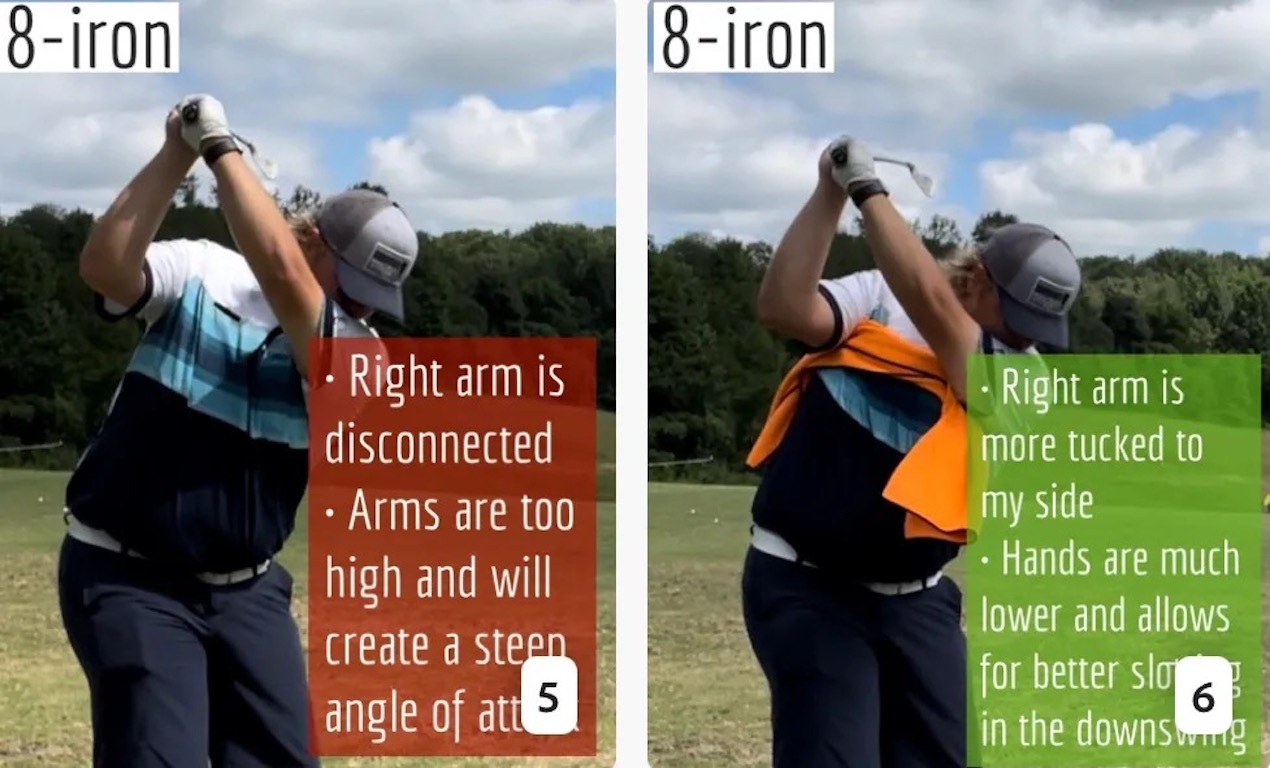
This is a classic drill that has been used for decades. However, the world of marketed training aids has grown so much during that time that this simple practice has been virtually forgotten. Because why teach people how to play golf using everyday items when you can create and sell a product that reinforces the same thing? Nevertheless, I am here to give you helpful advice without running to the nearest Edwin Watts or adding something to your Amazon cart.
For the “scoring clubs,” having a solid connection between the arms and body during the swing, especially through impact, is paramount to creating long-lasting consistency. And keeping that connection throughout the swing helps rotate the shoulders more to generate more power to help you hit it farther. So, how does this drill work, and what will your game benefit from it? Well, let’s get into it.
Setup
You can use this for basic chip shots up to complete swings. I use this with every club in my bag, up to a 9 or 8-iron. It’s natural to create incrementally more separation between the arms and body as you progress up the set. So doing this with a high iron or a wood is not recommended.
While you set up to hit a ball, simply tuck the towel underneath both armpits. The length of the towel will determine how tight it will be across your chest but don’t make it so loose that it gets in the way of your vision. After both sides are tucked, make some focused swings, keeping both arms firmly connected to the body during the backswing and follow through. (Note: It’s normal to lose connection on your lead arm during your finishing pose.) When you’re ready, put a ball in the way of those swings and get to work.
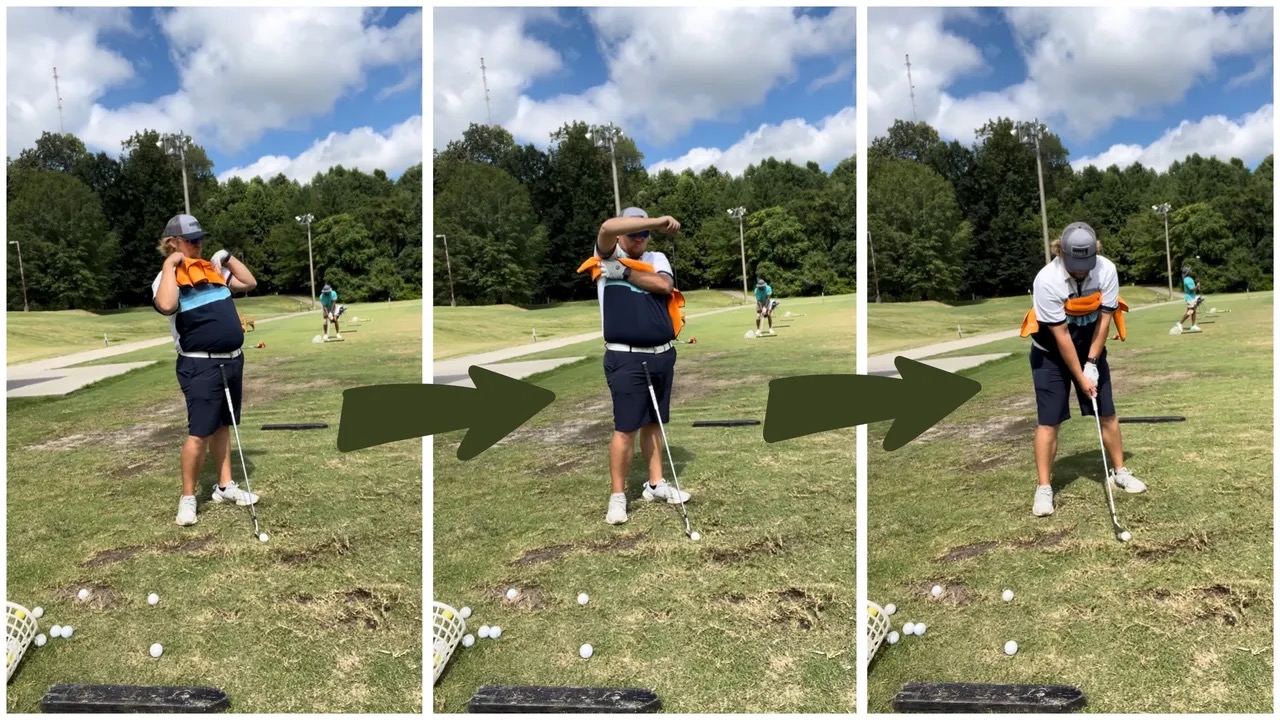
Get a Better Shoulder Turn
Many of us struggle to have proper shoulder rotation in our golf swing, especially during long layoffs. Making a swing that is all arms and no shoulders is a surefire way to have less control with wedges and less distance with full swings. Notice how I can get in a similar-looking position in both 60° wedge photos. However, one is weak and uncontrollable, while the other is strong and connected. One allows me to use my larger muscles to create my swing, and one doesn’t. The follow-through is another critical point where having a good connection, as well as solid shoulder rotation, is a must. This drill is great for those who tend to have a “chicken wing” form in their lead arm, which happens when it becomes separated from the body through impact.
In full swings, getting your shoulders to rotate in your golf swing is a great way to reinforce proper weight distribution. If your swing is all arms, it’s much harder to get your weight to naturally shift to the inside part of your trail foot in the backswing. Sure, you could make the mistake of “sliding” to get weight on your back foot, but that doesn’t fix the issue. You must turn into your trial leg to generate power. Additionally, look at the difference in separation between my hands and my head in the 8-iron examples. The green picture has more separation and has my hands lower. This will help me lessen my angle of attack and make it easier to hit the inside part of the golf ball, rather than the over-the-top move that the other picture produces.
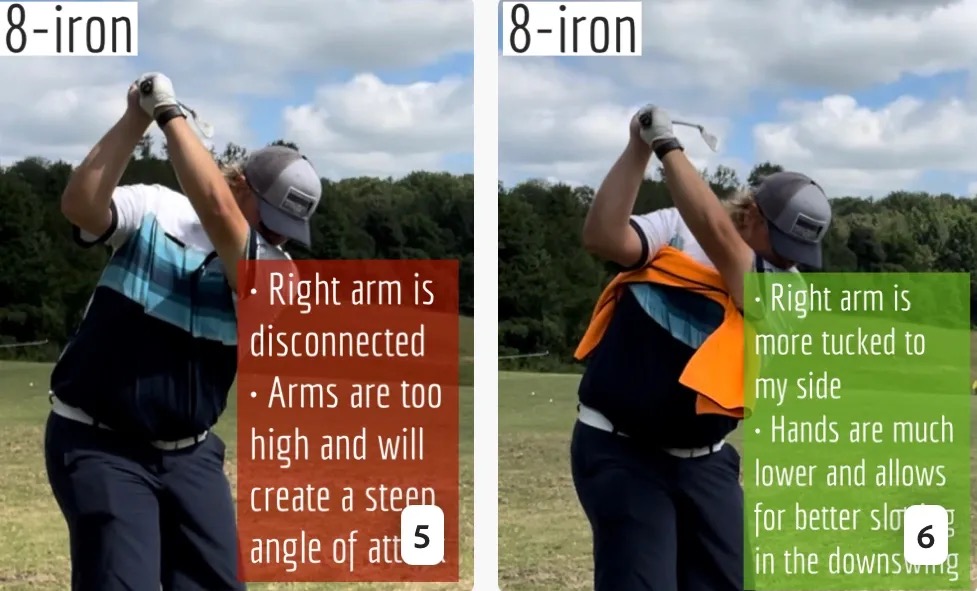
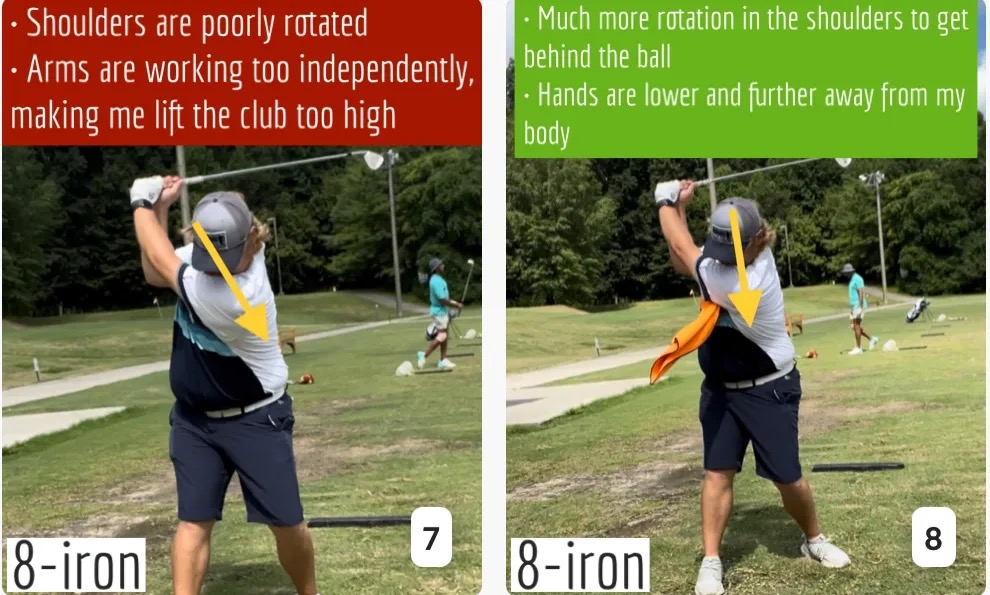
Stay Better Connected in the Backswing
When you don’t keep everything in your upper body working as one, getting to a good spot at the top of your swing is very hard to do. It would take impeccable timing along with great hand-eye coordination to hit quality shots with any sort of regularity if the arms are working separately from the body.
Notice in the red pictures of both my 60-degree wedge and 8-iron how high my hands are and the fact you can clearly see my shoulder through the gap in my arms. That has happened because the right arm, just above my elbow, has become totally disconnected from my body. That separation causes me to lift my hands as well as lose some of the extension in my left arm. This has been corrected in the green pictures by using this drill to reinforce that connection. It will also make you focus on keeping the lead arm close to your body as well. Because the moment either one loses that relationship, the towel falls.
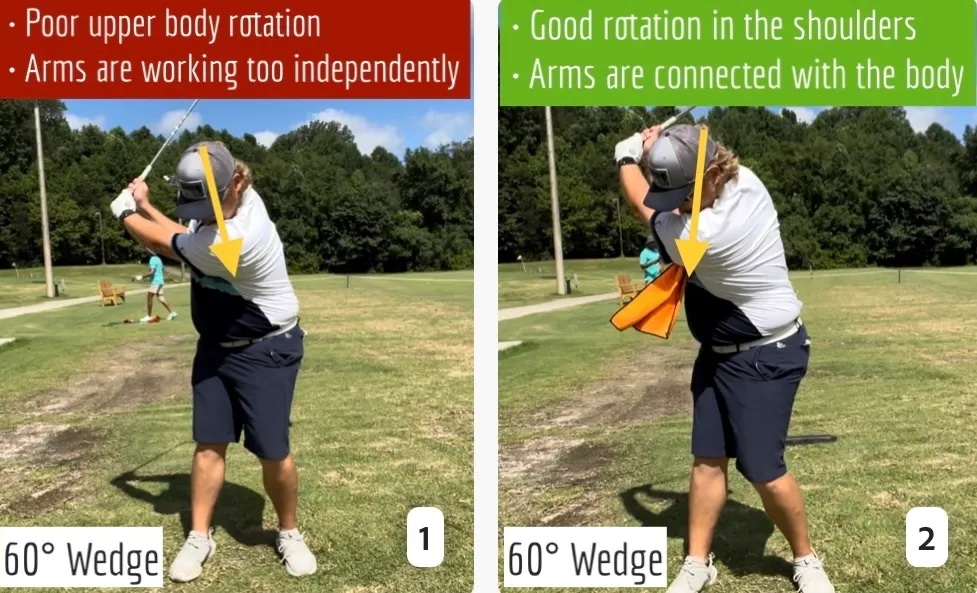
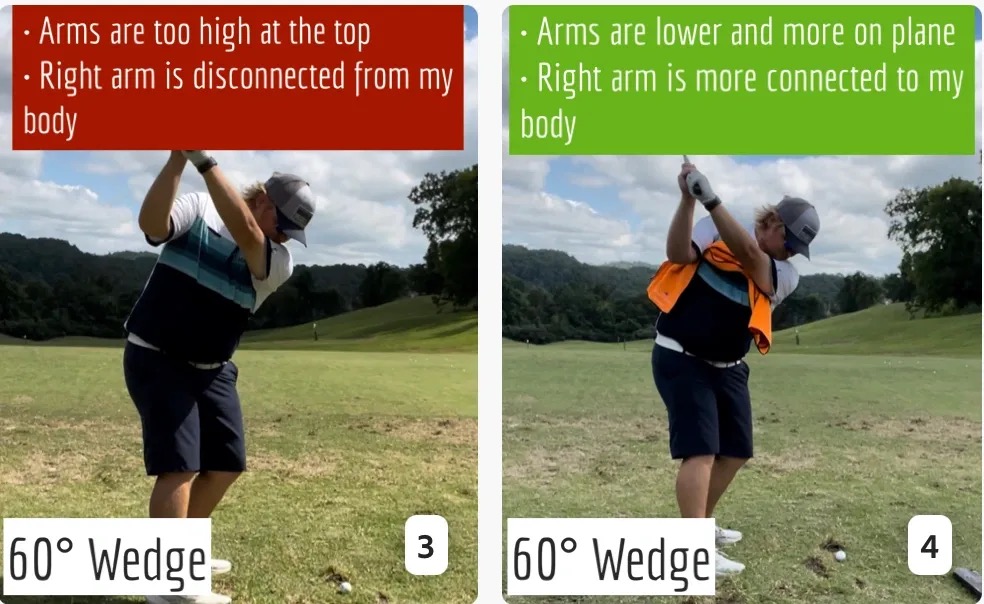
Conclusion
I have been diligent this year in finding a few drills that target some of the issues that plague my golf game; either by simply forgetting fundamental things or by coming to terms with the faults that have bitten me my whole career. I have found that having a few drills to fall back on to reinforce certain feelings helps me find my game a little easier, and the “towel drill” is most definitely one of them.
- LIKE12
- LEGIT2
- WOW2
- LOL0
- IDHT0
- FLOP2
- OB0
- SHANK8
-

 19th Hole1 week ago
19th Hole1 week agoDave Portnoy places monstrous outright bet for the 2024 Masters
-
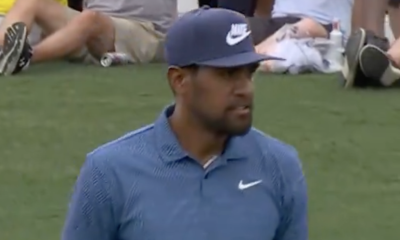
 19th Hole3 weeks ago
19th Hole3 weeks agoThings got heated at the Houston Open between Tony Finau and Alejandro Tosti. Here’s why
-
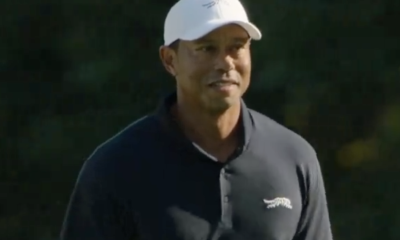
 19th Hole2 weeks ago
19th Hole2 weeks agoTiger Woods arrives at 2024 Masters equipped with a putter that may surprise you
-
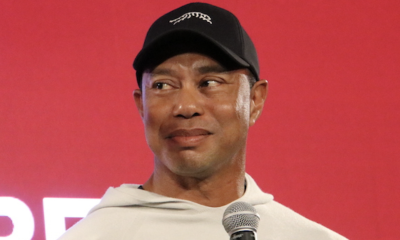
 19th Hole2 weeks ago
19th Hole2 weeks agoReport: Tiger Woods has ‘eliminated sex’ in preparation for the 2024 Masters
-
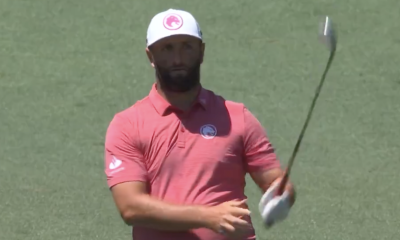
 19th Hole5 days ago
19th Hole5 days agoTwo star names reportedly blanked Jon Rahm all week at the Masters
-
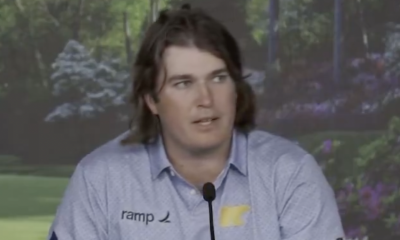
 19th Hole4 days ago
19th Hole4 days agoNeal Shipley presser ends in awkward fashion after reporter claims Tiger handed him note on 8th fairway
-
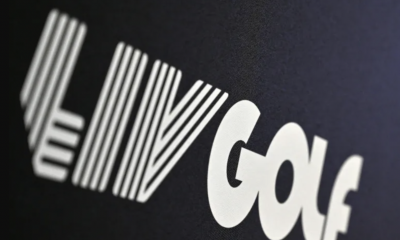
 19th Hole4 days ago
19th Hole4 days agoReport: LIV Golf identifies latest star name they hope to sign to breakaway tour
-
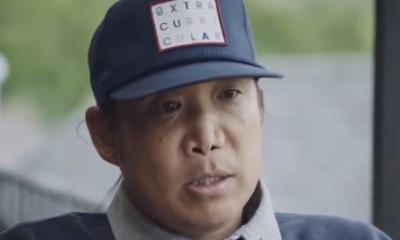
 19th Hole2 weeks ago
19th Hole2 weeks agoAddiction, spinal fusion, and scam artists – Everything Anthony Kim revealed in candid interview with David Feherty

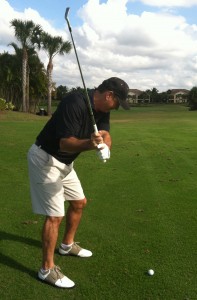
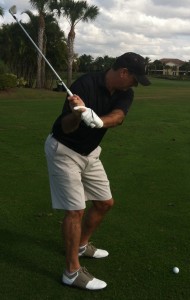








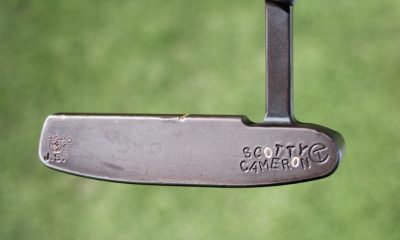

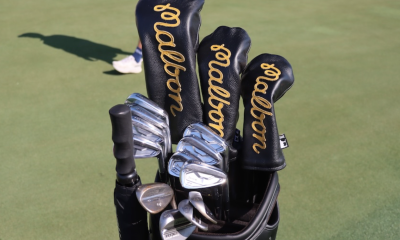

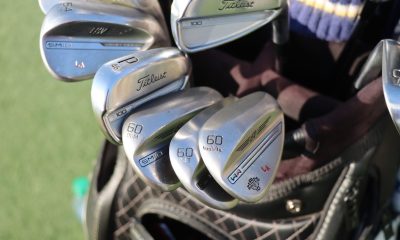

Manny
Jul 1, 2018 at 2:19 pm
There are a couple guys on tour that “chicken wing” it. Jordan Spieth is one that I’ve seen.
Mike
May 20, 2015 at 2:24 pm
I read with great enthusiasm your comments. I have a somewhat different situation. I have experienced severe trauma to my left shoulder which I believe causes me to retract just past impact to avoid any pain. Surgery is not an option so I grasping for straws. Your feedback is appreciated.
Cheers
Martin
Jan 9, 2013 at 5:51 pm
Good tip Mark. I am always thinking I am gonna practise halv swings, then when I stand on the range I fall into the same pattern and hit the balls full swing in stead. This coming season I will practice more half swings and more punch shots. Thats a promise! 🙂
And a comment to my comment… What I didnt say was that I have been working the whole winter (mostly in my living room since its very cold here and snow during the winter) to get the club more in front of me, mainly focusing on my backswing cause I have been to much inside going back before, leading to major inconsistency. Now I wonder what the reaction to this action will be? I believe I will hit the ball with a more open face if I dont let the club come flatter in to the ball and if i dont turn properly. Any comment on that?
Thank you!
mark
Jan 9, 2013 at 3:17 pm
A bent left arm can also cause a “chicken wing”.
To fix this do half swings at half speed concentrate on extending your left arm thru out this drill. Your left arm should be as straight as possible but relaxed. Hit a 100 balls a day and soon you will hitting it great.
Martin
Jan 9, 2013 at 8:12 am
Thanks for another great article!
In a two plane swing your supposed to be steep in the backswing, the club pointing at the ball or at least inside the ball when your left arm is horisontal, am I right? If I start my downswing with turning my hip a little, the club should flatten automatically, at least thats what I read? I think Penick calls that the magic move? IfI then continue to turn (seperating the lower and upper body of course) I cant go wrong can I?